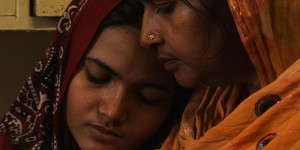 At the age of 13 in 2007 Kainat Soomro, was brutally gang raped by four men from her village in Pakistan as she walked home from school. Since then she has drawn international attention because of her refusal to accept it all and be silent and has instead been steadfast in her determination to obtain justice against her attackers.
At the age of 13 in 2007 Kainat Soomro, was brutally gang raped by four men from her village in Pakistan as she walked home from school. Since then she has drawn international attention because of her refusal to accept it all and be silent and has instead been steadfast in her determination to obtain justice against her attackers.
The response from her fellow villagers reveals them to be utterly abhorrent human beings bereft of any human empathy or compassion …
The village declared her “kari”, or a black virgin, and ordered her family to carry out an honor killing to end the shame a rape victim brings to a family, according to Pakistani culture.
The alleged rapists beat her father and one of her brothers. Her older brother went missing for three months and was found murdered.
But Kainat’s parents refused to kill their daughter, instead deciding to take up her cause in a legal system which places the burden of proof on the victim.
“They told me I am not a real man,” Kainat’s brother, Sabir tells the film-makers, Habiba Nosheen and Hilke Schellmann, “[that] you failed to follow your tradition, you failed to kill your sister.”
Meanwhile, threats of death and further violence have forced the Soomros from the house they owned in Dadu to the city of Karachi, where all 18 family members now live in a two-bedroom apartment.
Why is this news now, it all happened back in 2007? the answer is that a documentary made about it all, entitled Outlawed in Pakistan, was selected for screening in the 2013 Sundance Film Festival, and so the story reached a far wider audience.
Is this a story about one girl’s fight against a small village populated with immoral superstitious gobshites? No, the honour belief infests the entire Pakistani culture …
Her father says the family has “lost everything” pursuing the case in which neither the police or government authorities will take any responsibility.
When Kainat attends court she undergoes a barrage of “nasty” questions, up to 300 at a time, including “what part of your clothing did you remove?” or “who raped you first?”.
The presiding judge is affronted that Kainat has brought the charges, and rules against her in part because she has accused a father and son of a gang rape.
“In his view,” the film’s narrator says, “he said that would never happen in Pakistan” and describes Kainat’s accusations “as a product of her own fantasy”.
The men are acquitted, and, in an interview with the film makers, appear bewildered at why their accuser didn’t just stay at home “and keep quiet”.
They see their acquittal as proof Kainat “does not have good character. If she was a decent woman, she would have sat at home, silent.”
The lack of justice is quite frankly stunning, but perhaps not a surprise – this is Pakistan, a state that has manifested astonishing degrees of intolerance, misogyny, violence and murder, all fuelled by an irrational belief that is not actually true. Is everybody in Pakistan driven to be like that? No, of course not, many (I would like to think most) are decent and honourable, but sadly because the belief is so firmly entrenched, it rips the culture asunder and destroys countless numbers of lives.
Did Islam really play a role here? Indeed it did, during her captivity, Kainat was “married” to Ahsan Thebo, one of the alleged rapists. This tactic is apparently used often in Pakistan to avoid the harsh penalty for rape – death. A cleric who performed the marriage claimed that she looked eighteen and that she did not appear to have been forced into the marriage. The judge upheld the marriage according to Islamic law, even though she was thirteen and below the age of consent according to Pakistani law at the time. She did remember signing some unknown documents and that her thumb prints were taken at gunpoint. None of the alleged rapists brought up the marriage when Kainat was accused of having sex outside of marriage, and so the judgement of the village elders was that she should be killed. It was only when the men were accused and stood trial that they brought out that defence.
The heroes here are here entire family, they have stood with her …
Kainat said that despite the pressures her family refused to kill her.
“It is the tradition, but if the family doesn’t permit it, then it won’t happen. My father, my brother, my mom didn’t allow it,” she said.
And that defiance has left the family fearing for their lives. The family’s new home in Karachi has been attacked a number of times.
It has indeed cost them a great deal, her brother is now dead, he was murdered a month after the court ruling for simply defending his sister during the ordeal.
As for the documentary itself, it has been banned in Pakistan.
Links
- Those in the US can view the documentary here (sadly US only, it is blocked elsewhere)
- Article from 2011 in The Atlantic
Why don’t we protect this girl and just kill all these assholes